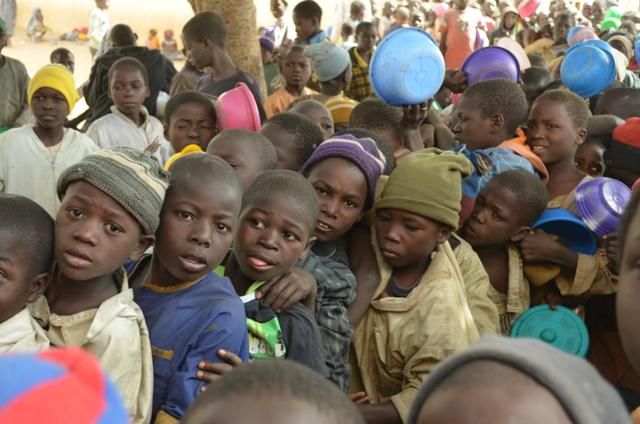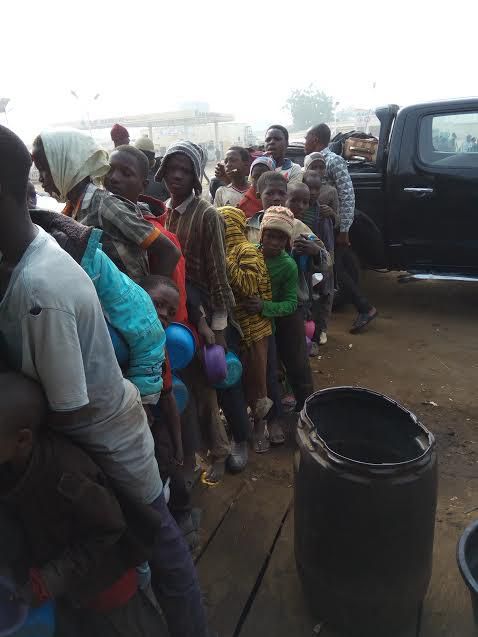‘87 percent of poor people in Nigeria are from the North’--World Bank
)
The north is the reason why Nigeria is the poverty capital of the world, according to a latest World Bank report.
Northern Nigeria accounts for a chunk of the poorest people in Nigeria, according to a World Bank report titled ‘Advancing social protection in a dynamic Nigeria.'
The report was published after a research by the World Bank that spanned 2011-2016.
Made public on January 28, 2020, the report states that “Nigeria experiences high inequality along geographic lines, with poverty mostly concentrated in the North and in rural areas.
“Poverty in the northern regions of the country has been increasing, especially in the North-West zone.
“Almost half of all the poor lived in the North-West and the North accounts for 87 per cent of all the poor in the country in 2016.”
Poverty and Boko Haram
The report also states that there is a nexus between poverty in the north and an insurgency that has all but crippled the northeast region.
There are also more poor people in rural Nigeria than there are in the cities, the research found.
“Poverty rates in the southern zones were around 12 per cent with little variation across zones. The South-South zone saw the most significant drop in poverty from 2011-2016.
“Poverty was significantly higher in rural areas of the country in 2016. An estimated 64 per cent of all poor lived in rural areas and 52 per cent of the rural population lived below the poverty line in 2016. In contrast, the poverty rate in urban areas remained stable at 16 per cent between 2011 and 2016.
“Regionally, the North lags far behind the South in every human capital outcome. People in the Northern regions are also more vulnerable to falling into poverty.

“Disasters and conflict have displaced many Nigerians, especially in the North-East. According to estimates provided by the International Displacement Monitoring Centre, there were more than two million internally displaced persons in Nigeria as of 31 December 2018.
“In 2018 alone, more than 600,000 Nigerians were displaced due to natural disasters and more than 540,000 were displaced due to conflict and violence.
“In the North-East, the emergence of the militant Islamist group Boko Haram since 2014 has not only caused large scale displacement, but also several incidences of kidnapping, death, and injuries, and the erosion of social contract due to widespread perception of a failed political promise. Poverty and deprivation have played a central role in fostering a social divide.
“The youth used by Boko Haram to partake in the conflict are jobless, without skills, or trades, and are easily susceptible to radicalisation,” the report read.
Poor governance and rising poverty in Nigeria
The report also blames weak governance, poor quality of education, poor social service delivery and inadequate infrastructure for worsening poverty in Nigeria.
“Social protection measures in the country are neither well-suited to respond to conflict, nor well-placed to anticipate and mitigate the risks of natural disasters caused by climate change.
“Poverty remains high in Nigeria due to its dire social service delivery outcomes and lack of basic infrastructure.

“Nigeria has the highest number of out-of-school children of primary school age in the world with nine million children out of school.
“There has been little change in vaccination rates over the last 25 years and Nigeria is set to overtake India as the country with most under-five deaths in the world," the report reads.
Nigeria as world poverty capital
Nigeria has long been named as the poverty capital of the world. In 2018, the World Poverty Clock estimated that 90.8 million Nigerians are living in extreme poverty.
Nigeria has also overtaken India as the nation with the highest number of people living in extreme poverty across the world, with an estimated 86.9 million people measured to be living on less than $1.90 (N684) a day.
![Aisha blows hot on Security forces; Y7ou won't believe what she said [VIDEO]](https://image.api.sportal365.com/process/smp-images-production/pulse.ng/17082024/1f976edf-1ee2-4644-8ba1-7b52359e1a8f?operations=autocrop(640:427))
)
)
)
![Lagos state Governor, Babajide Sanwo-Olu visited the Infectious Disease Hospital in Yaba where the Coronavirus index patient is being managed. [Twitter/@jidesanwoolu]](https://image.api.sportal365.com/process/smp-images-production/pulse.ng/16082024/377b73a6-190e-4c77-b687-ca4cb1ee7489?operations=autocrop(236:157))
)
)
)
)
)
)
)
)
![2026 Golden Globes: Teyana Taylor, Timothee Chalamet and the biggest winners [FULL LIST]](https://sportal365images.com/process/smp-images-production/pulse.ng/12012026/002666db-358d-4deb-9510-84cdb274ffda.png?operations=autocrop(112:112))
)
)